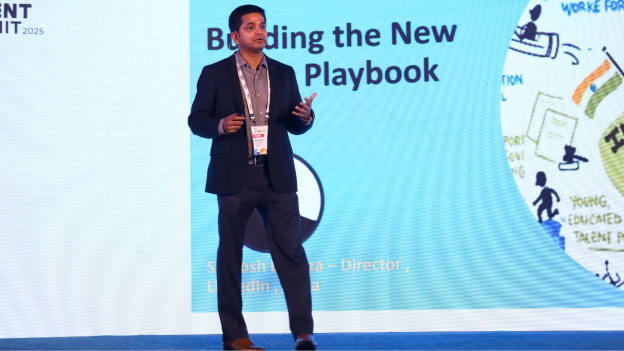The new GCC playbook: Building a talent-driven future in India

India is no longer just a hub for cost arbitrage. For the world’s most ambitious companies, it’s a launchpad for talent-driven innovation. As Global Capability Centres (GCCs) shift gears, success will increasingly depend on how well they attract, retain, and develop future-ready talent.
At the GCC Talent Summit in Hyderabad, Santosh D’souza, Director–Talent Solutions at LinkedIn India, shared insights on creating a future-ready talent strategy. He emphasised the shift to a skills-first approach, the growing impact of AI on job roles, and the critical importance of soft skills in the evolving workplace. Drawing from LinkedIn’s data, he highlighted how India’s GCCs are uniquely positioned to lead this transformation.
A new lens on talent: It’s all about skills
Santosh emphasised that the traditional ways of hiring and workforce planning, based on titles or degrees, are being rapidly outpaced by a new reality: skills-first hiring.
From customer success roles to tech positions, AI is automating routine tasks, emailing, reporting, and even basic troubleshooting. But while automation handles the repetitive, human-centric capabilities, critical thinking, communication, and storytelling are emerging as core differentiators.
India’s talent leaders are ahead of the global curve in adopting a skills-first approach—it’s no longer about where you studied or what your last title was.
AI is here, but are organisations ready?
According to LinkedIn’s research, while 90% of executives agree AI will shape the future of work, only 13% of Indian GCC leaders currently have a clear roadmap for integrating AI into workflows. That’s why, as D’Souza shared, LinkedIn itself has mandated its teams, including non-tech teams, to upskill in AI through tools like LinkedIn Learning, CoPilot, and ChatGPT.
AI tools can proactively recommend learning pathways, identify adjacencies in skills, and match employees to business needs, even when those employees may not self-nominate. It’s not just about skill-building, but making sure that talent is discovered and put to use, D’Souza remarked.
Why skills now matter more than ever
Santosh highlighted the growing shift to a skills-first hiring approach, noting that Indian TA leaders are ahead of their global peers in this transformation. At the same time, roles like Customer Success Manager are being partially automated, making soft skills like storytelling, problem-solving and communication more valuable than ever.
LinkedIn’s platform data reveals seismic shifts in the talent landscape:
- 50% of the jobs people are applying for today didn’t exist 20 years ago.
- 64% of skills used in current roles have already changed, and are expected to hit 70% by 2030.
- Members are actively upskilling via LinkedIn Learning, adding new skills at a record pace.
When you align your learning programs to an individual's career development, you will see impact.
The skills-first talent strategy
Santosh outlined a few imperative actions HR leaders must prioritise to stay ahead:
- Adopt a skills-first mindset: Organisations need to move beyond pedigree hiring to skills-based hiring, especially in India, where TA professionals are showing strong progress compared to global peers.
- AI literacy is a must-have: AI isn’t just for engineers. At LinkedIn, even the sales and marketing teams are mandated to add new AI capabilities. Despite knowing AI’s strategic importance, only a few GCCs in India are currently integrating it into workflows—an opportunity gap that needs urgent attention.
- Prioritise human skills as a competitive edge: With routine tasks becoming automated, soft skills will be the ultimate differentiator. Skills like communication, adaptability, and collaboration will define how teams thrive amidst disruption.
Unlocking talent potential with strategic visibility
For GCCs, the focus must extend beyond skill-building to fostering visibility, alignment, and agility across the organisation. D’Souza emphasises that combining AI-driven insights with a culture of transparency and collaboration empowers businesses to identify and deploy the right talent at the right time. This strategic approach not only maximises individual capabilities but also drives sustained business impact, proving that true advantage lies in knowing how and where to leverage skills effectively.













